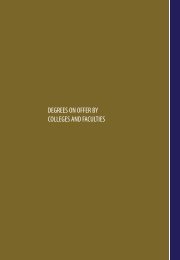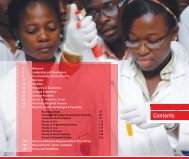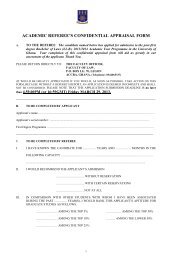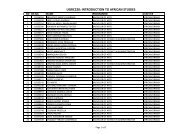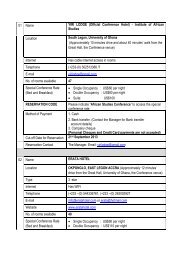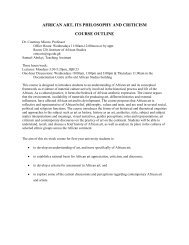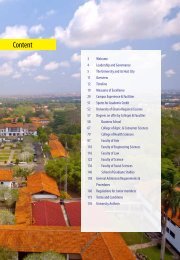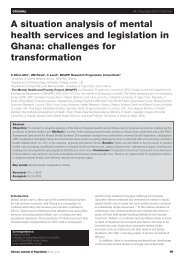Sciences - University of Ghana
Sciences - University of Ghana
Sciences - University of Ghana
You also want an ePaper? Increase the reach of your titles
YUMPU automatically turns print PDFs into web optimized ePapers that Google loves.
23. APPEAL<br />
Any Junior Member who is aggrieved by any disciplinary sanctions may appeal to<br />
the Vice Chancellor through the Head <strong>of</strong> Hall for a review within seven days <strong>of</strong> the<br />
notification to him <strong>of</strong> the sanctions imposed on him. The Vice-Chancellor, on receipt<br />
<strong>of</strong> a report from the appropriate source, may request a review <strong>of</strong> the sanctions so<br />
imposed. When carrying out a review, the Vice-Chancellor may act on the advice <strong>of</strong><br />
a committee on which student interests are represented.<br />
APPENDIX A<br />
MEMORANDUM FOR THE GUIDANCE OF STUDENT JOURNALISTS<br />
THE LAW OF GHANA<br />
All student publications, even though they may be circulated only within a Hall or the <strong>University</strong>,<br />
are subject to the law <strong>of</strong> the land. This memorandum is intended to give them general information<br />
about their legal liabilities. It is not a substitute for pr<strong>of</strong>essional legal advice, and it only deals with<br />
those parts <strong>of</strong> the law which are most likely to concern student publications. But a journalist who<br />
uses his common sense and the information given here should not run into legal difficulties.<br />
The Civil Law <strong>of</strong> Libel<br />
Everyone concerned with a publication runs the risk <strong>of</strong> being sued and made to pay damages if the<br />
publication libels anyone. Material published is libellous - for example, if it suggests that the person<br />
has committed a crime, or is dishonest, or immoral, or not to be trusted, or has misconducted himself<br />
in his <strong>of</strong>fice. It does not have to refer to the person by name - it is sufficient if ordinary people would<br />
understand what is published as referring to the person who brings the action.<br />
The liability is not confined to the author <strong>of</strong> the libellous article or picture; everyone on the editorial<br />
committee would also be liable, and even those who take part in typing or distributing the publication<br />
may be liable as well. So if you take any part in a publication, it is wise to realise that you are legally<br />
responsible for what is included in it, and normally it makes no difference whether you troubled to<br />
read the copy or not.<br />
You have a complete defence if what is published is true, so long as you can actually prove this in<br />
court. But this may be difficult so the safe rule is to be very careful before you publish an attack on a<br />
person's character.<br />
You also have a defence (called "fair comment") which allows you to comment upon matters <strong>of</strong><br />
general public concern, and express opinion and voice criticism upon such matters. To come within<br />
this defence, you must confine your opinion to matters which are <strong>of</strong> concern and interest to the public<br />
generally (though, normally, a person's private character is not <strong>of</strong> public interest). You must also<br />
avoid making false factual statements; the law allows you to express your opinions, but not to tell<br />
untruths. But there is nothing against your expressing your opinions on matters <strong>of</strong> public concern in a<br />
vigorous way, though if you express them in an indecent way then you must expect a court to doubt<br />
your good faith.<br />
The Criminal Law <strong>of</strong> Libel<br />
If you carelessly publish a libel, you can be fined, and if you do so deliberately you can be imprisoned<br />
too. The details <strong>of</strong> the law are set out in the Criminal Code; the rules are broadly the same as the<br />
rules <strong>of</strong> the Civil Law, with one important difference - truth is only a defence "if it was for the public<br />
benefit that the matter should be published". Consequently, even a true statement about, for<br />
example, another student's private life might be criminal even though the student himself could not<br />
sue for damages.<br />
40





